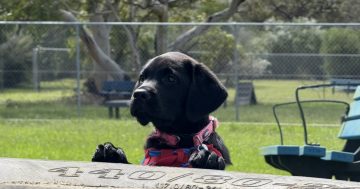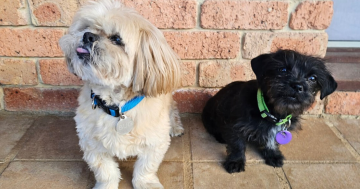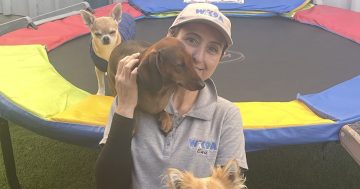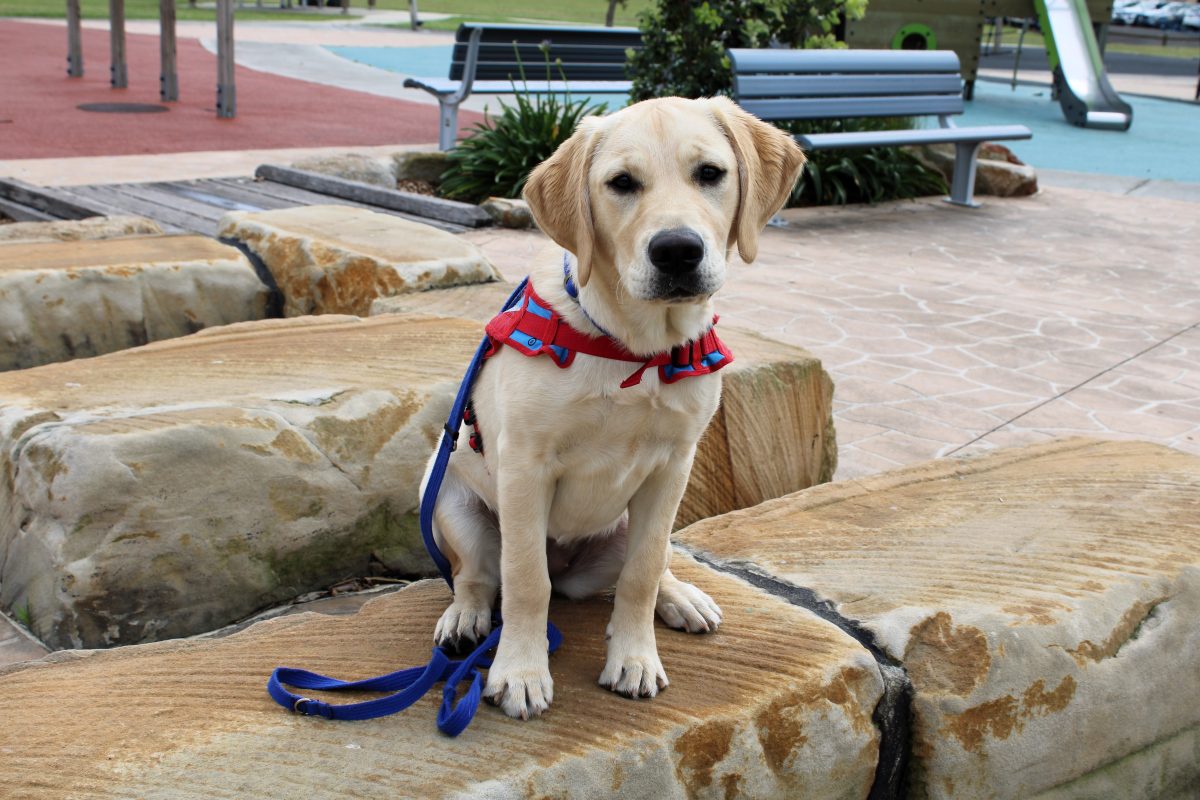
Penny is learning to be an assistance dog with the help of her puppy educator Mel. Photos: Keeli Royle.
They’re the support pets that help members of our community to live independently and safely, but even assistance dogs need to start somewhere.
Puppy educators are crucial in helping develop those essential first steps that help the animals to be successful in their training, and Assistance Dogs Australia says there is a desperate need for more volunteers as it hopes to double the number of dogs in the program within the next year.
Mel Boon first enquired about joining the program last year, and as she’s recovered as a new amputee, she’s had an opportunity to give back to the community.
“I’ve met lots of people who have assistance dogs or are waiting on assistance dogs, so it just felt like we had the time and we should do something with it,” Mel said.
Despite her own concerns that her disability or other pet could pose as a barrier to her volunteering, Mel was found to be a perfect candidate and was paired with Penny, who she will look after until the pup is 12 to 14 months old.
The five-month-old labrador is full of love and still learning the ropes, but showing all the signs of progress.
“It’s really incredible, it’s amazing how smart they are,” Mel said. “We’ve always had dogs, but I’ve never seen a dog that learns like they do, it’s like they are hungry to learn all the time.
“I think she was 10 kilos when we got her, she’s now over 20.”
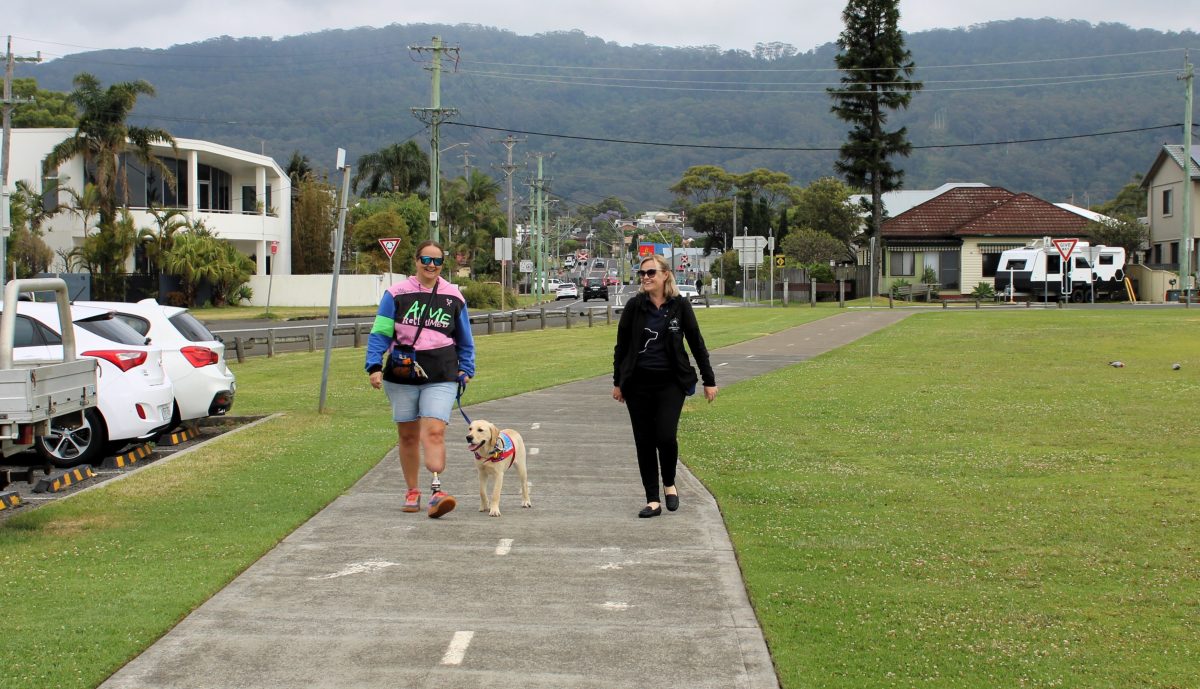
Puppy educators are required to perform everyday pet owner tasks like daily walks.
Puppy educator supervisor Neisha Purdie said these early months are vital as Penny prepares for important jobs like supporting people with physical disabilities, PTSD and autism, or becoming a court facility dog.
“It’s obviously really important that the foundation start of the training, the routine, that structure just sets them up the best way possible to succeed and the biggest parts is the socialisation so getting them out and about into the community,” she explained.
“If we can tick off as many places, environments and experiences as we can, then when they’re placed with a client, there hopefully won’t be too many things that come up that is a first time for them,” she said.
“It helps them be able to regulate in that environment quickly and still be able to have focus on the client.”
But without volunteer puppy educators, the situation would be very different.
“To have the puppies in a kennel environment, which is what would have to happen if we didn’t have volunteers able to bring them up in their homes, just wouldn’t be the same,” Neisha said.
“They can’t get that same home and community interaction and that great foundation start in a kennel environment that they can in a home so it’s extremely important.”

Puppy educator Mel with Penny and supervisor Neisha.
And the local need is increasing.
“In the Illawarra at the moment within the puppy education we have about 10 teams but we are growing rapidly as an organisation,” Neisha said.
“We’re looking at doubling the amount of puppies that go through our puppy education in the next year to two years, so that’s double the amount of volunteers that we’ll need.”
Volunteers are assessed case by case and having children, pets or living in an apartment doesn’t mean you’re ruled out, as long as you can commit to spending most of your time with the dog, wherever you may be.
The training is run mainly by the supervisor, while the puppy educator is expected to perform normal pet ownership tasks like daily walks.
And there’s 24-hour support from Assistance Dogs Australia for any and every matter, as well as vet bills, food and preventative medications all covered.
“There’s no cost, just a bit of your time and lots of love and kisses,” Mel said.
The hardest part people might find is saying goodbye.
“We had a really big conversation as a family about that as well because we are big dog lovers, but I think what you’re giving someone outweighs it 100 times over,” Mel said.
“What a gift to give a family.”
Volunteering could be a good trial for future pet ownership, and even if you can’t properly commit, there are options to help out or do shorter caring periods.
“If you are working and you don’t qualify because you’re not home, you can also be a weekend or respite carer for the puppies,” Mel said. “So, for example, if we were going away and we didn’t have anyone to look after Penny, they would take care of her during that time.”
“We always need puppy carers because as many puppy educators that we have, we need the puppy carers to support them when they can’t have them.”
To find out more about the options available or to see if you’re suitable enquire through the Assistance Dogs Australia website.










